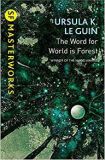The Word for World is Forest by Ursula K Le Guin
| The Word for World is Forest by Ursula K Le Guin | |
|
| |
| Category: Science Fiction | |
| Reviewer: John Lloyd | |
| Summary: A sci-fi classic that is unfortunately clunky and dated, but still interesting. | |
| Buy? No | Borrow? Maybe |
| Pages: 144 | Date: March 2015 |
| Publisher: Gollancz | |
| External links: Author's website | |
| ISBN: 9781473205789 | |
|
| |
There probably is an Ursula K Le Guin book for everyone. For fans of consummate, ageless fantasy, there are the first few Earthsea books, that I met as a child and still hold in high esteem. For the feminist reader, there are much more recent novels that I would even baulk at putting on a genre shelf, so light are the sci-fi or fantastical trappings. But there are also classics of the former genre, too – hard sci-fi written at one of the past peaks of the form, and deemed timeless, as this current reprint suggests. These are sci-fi works that mean something – that shine a light on then-current thinking, or then-recent history or actions, but that are still designed to appeal to the hard-core genre fan. The example of The Word for World is Forest is one such, with an obvious nod to the Vietnam situation. It's a shame then that for me, at the remove of 2015, it doesn't tick many more boxes, all told.
In an incredibly thinly-disguised attack, Ms le Guin portrays the American gung-ho militaristic mindset as it attacked Vietnam, and grounds it in a devil-may-care, fire-bombing, resource-ignoring, racist bigot. He's not attacking Vietnam, however – no, his station is a planet far removed from a very far-future Earth, which desperately needs as many shipments of extra-terrestrial wood as it can get, seeing as it itself is a dying place. Never mind the fact that all the natives, who have an intimate form of secondary, dreamlike existence, and a matriarchal society (of course), desperately rely on the woodlands that have remained virgin for millennia. They're just in the way, and with our human machinery and carpet-bombing possibilities, they're surely not going to break out of their slave-like existence and cause any trouble – are they?
I can't see the Vietnam allegory being the problem here, however blatant it is and however dated it may be. No, we still get the feel to watch Apocalypse Now every now and again and it's not bound to date. This book, though, has, and not just because it's been pretty much usurped, to borrow another cinematic metaphor, by Avatar. The varying chapters are fine at bringing the different mindsets to play – human and other – but too many of the characters have to have Basil Exposition-styled interior monologues to get the story points across, and that doesn't work. There's the way humans are racist – not only amongst their own species but against other intelligent life-forms, even those that are linked to us through a planet-populating mutual ancestor. There's the way the book is part of a greater le Guin universe, so we're given too light a short-hand introduction to all the characters, meaning some only get seen in a clear way through a bigoted commentary from our anti-hero and not through the storytelling.
Still, despite that there remain plusses that do make the book worth a quick look – and it's not hugely long by many genre standards. The whole world of the indigenous peoples comes across very nicely, through both ends of the lens shone on it. There's the whole character of the main human, Davidson – even if, like me, you hold no truck with the idea women should not be expected to write great male characters and vice versa, this is a fine creation. And the plot isn't as one-note or formulaic as things would have you suggest. In the end, though, for me, the book was proselytising too much – too clearly written for conveying a political point – to be completely entertaining.
I must thank the publishers for my review copy. We also have a review of The Wind's Twelve Quarters and The Compass Rose by Ursula K Le Guin.
We think The Left Hand of Darkness by Ursula K Le Guin is a much more successful visit to this universe. Any other fans wishing to catch-up with the whole genre should examine What Makes This Book So Great: Re-Reading The Classics Of Science Fiction And Fantasy by Jo Walton. You might also enjoy Bill, the Galactic Hero by Harry Harrison.
Please share on: ![]() Facebook,
Facebook, ![]() Twitter and
Twitter and
![]() Instagram
Instagram
![]() You can read more book reviews or buy The Word for World is Forest by Ursula K Le Guin at Amazon.co.uk Amazon currently charges £2.99 for standard delivery for orders under £20, over which delivery is free.
You can read more book reviews or buy The Word for World is Forest by Ursula K Le Guin at Amazon.co.uk Amazon currently charges £2.99 for standard delivery for orders under £20, over which delivery is free.
![]() You can read more book reviews or buy The Word for World is Forest by Ursula K Le Guin at Amazon.com.
You can read more book reviews or buy The Word for World is Forest by Ursula K Le Guin at Amazon.com.
Comments
Like to comment on this review?
Just send us an email and we'll put the best up on the site.


